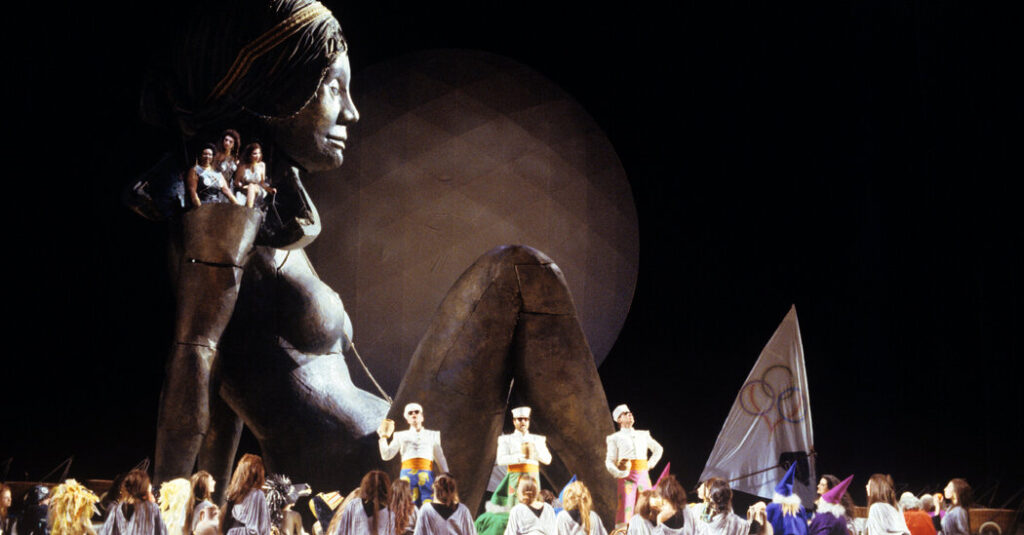On a rainy, late October evening in Paris, a small group of music lovers gathered in the halls of the Fondation Singer-Polignac, a hôtel particulier close to Trocadéro, the elegant area across the Seine from the Eiffel Tower.
They sipped champagne and nibbled canapés before taking their seats for a private preview of excerpts from Karlheinz Stockhausen’s opera “Montag aus Licht” (“Monday from Light”). The concert was led by the French conductor Maxime Pascal and performed by his musical ensemble, Le Balcon, ahead of their complete performance of the five-hour work on Nov. 29 at the Philharmonie de Paris as part of the Festival d’Automne, an annual, multidisciplinary arts event.
From a small stage in the mansion’s ornate salon, a trio of sopranos vocalized hauntingly, their voices bending and merging with three electronic keyboards; a children’s chorus ran onstage bleating like animals; three tenors gargled water and spit it out into a large plastic bucket; and a vocal actor shouted manically.
Those who stayed past intermission witnessed an intricate duet for flute and basset horn in which the soloists played while circling each other in a highly choreographed pas de deux.
The evening was an amuse-bouche for “Montag,” the first part of Stockhausen’s epic “Licht” cycle of seven operas named for the days of the week. Each day is associated with a color, celestial body and symbolic theme. “Montag” celebrates Eve, envisioned less as the first woman of Genesis than as a goddess of universal fertility, the oceans and the moon.
Stockhausen, one of the most innovative and influential composers of the late 20th century and a pioneer of electronic music, wrote the septology over a period of 26 years. The operas premiered out of order and piecemeal between 1981 and 2012. But to date, it has never been performed as a unified whole; Pascal is the first conductor to embark on a full cycle.
“I think that the ears of the end of the 20th century were not ready for this music,” Pascal said over lunch several days after the private concert. “It was really written for the ears of the 21st century.”
Stockhausen, he added, “was taking such a new path.”
Nearly twice the length of Wagner’s 15-hour “Der Ring des Nibelungen,” “Licht” is a highly idiosyncratic blend of autobiography, myth and eschatology that follows Eve, Lucifer and the archangel Michael. Unlike the “Ring” cycle, it eschews a linear narrative and rarely resembles a traditional opera. It also places remarkable — and remarkably specific — demands on its musicians, whose roles are notated with a precision that can seem obsessive or manic.
Set pieces like “Helicopter String Quartet” from “Mittwoch” — arguably “Licht’s” most famous excerpt, in which the musicians play from four airborne choppers — have fueled a certain popular perception of “Licht” as the apogee of artistic lunacy, a work either unperformable or frankly not worth the effort.
Pascal disagrees. “We need to realize that when people talk about ‘Licht,’ they are talking about a work that was never actually premiered,” he said. “We are talking about a work even I have never heard.”
The one-night-only performance at the 2,400-seat Philharmonie de Paris sold out almost immediately back in March. The production, staged by the Italian director Silvia Costa, is the sixth in Pascal’s ongoing effort to mount the complete “Licht,” which began in 2018 with “Donnerstag” (“Thursday”) at the Opéra Comique in Paris and is projected to culminate in fall 2026 with “Mittwoch” (“Wednesday”) at one of Europe’s largest opera houses. In 2028, Stockhausen’s centenary year, Pascal hopes to conduct all seven operas over a single week — a feat that, given the cycle’s cost, scale and technical demands, would be the first of its kind.
While conducting “Donnerstag,” Pascal met Joséphine Markovits, the Festival d’Automne’s longtime music director, who died last year. The festival became a key partner in seeing the project to fruition.
“The experience is something absolutely insane, mind-blowing, and requires an enormous amount of effort, and the right place to do this is not a normal music institution,” said Clara Iannotta, the Italian composer and Markovits’s successor, in an interview at the Festival d’Automne’s offices across from the Louvre. She added that more than one performance of “Montag” at the Philharmonie was financially unfeasible.
“You have to create this kind of madness,” she said. “It has to be an event: something that you will never forget.”
When “Montag” was first staged at La Scala in Milan in 1988, a large sculpture of Eve as a naked woman with her legs apart dominated the stage. In the second act, Eve’s symbolic impregnation by music was represented by an elongated piano sliding between her thighs. Touches like these have led some to see the opera as objectifying women.
“For sure it’s a celebration of woman, but it was thought of by a man,” said Costa, who previously staged “Freitag” at Opéra de Lille in 2022 as part of the current cycle. The solution, for her, is to find a way to embrace the opera’s themes of spiritual, artistic renewal and literal fertility, but from a female perspective.
Instead of the spread-legged statue of the original staging, Costa’s production features a real pregnant woman standing at the top of a lighthouse. “She will be the light, actually,” Costa explained. “I think that this breaks every possible cliché because there is a real woman in the actual state of giving life.”
Pascal thinks there has been a serious misunderstanding about the meaning of Stockhausen’s instructions.
“If you don’t read the score, you might think that Stockhausen wants to be the stage director, but the only goal for Stockhausen, the quest of his life, we could say, was to make music and sound visible,” he said. “What is very specific for us as interpreters of ‘Licht’ is that when there is a gesture written into the score, it’s not theater. It’s written by a musician, so for him, it’s music.”
Pascal sees those details not as dictatorial micromanaging but as a guide to “make us go deeper in our roles as musicians and as artists.”
“Stockhausen makes us understand what is sacred in what we do,” he said. “What is sacred is not the composers. Composers are not gods; the score is not a sacred text. What is sacred is the act of playing, the act of singing, the act of writing and the act of listening.”
The post With a New ‘Montag,’ Stockhausen’s ‘Licht’ Cycle Nears Completion in Paris appeared first on New York Times.




